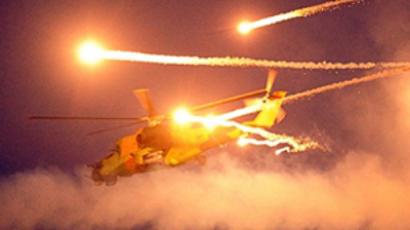The revolution will be twitterized
With a photo of his face pasted over that iconic photo of Che Guevara as his avatar and a stream of sarcastic missives, Dmitry Rogozin could be mistaken for an ordinary politically-opinionated Twitterer.
But he is not. Instead, Dmitry Rogozin is Russia’s envoy to NATO – one of few high-ranking politicians who chose to embrace the Twitter phenomenon.
Considering the country’s relationship with the military alliance is akin to a particularly rancorous soap opera, Rogozin holds one of the most visible and sensitive posts in the country.
But his offerings are anything but diplomatic. The 140-character limit the micro-blogging site imposes on its members’ updates has unleashed a pungent, but laconic wit. “NATO suggested holding the NATO-Russia Council meeting at level of Foreign Ministers in format of a lunch. Maybe we should meet in a sauna?” and “On Friday I gave a speech at NATO's Defence College. I got a bit blinded by the gold of the shoulder straps :)” give a fair representation of Dmitry Rogozin’s style. In his lighter moments, the Envoy is just as prepared to make uncharitable quips on the shortcomings of the national football team, or the air quality in Moscow.
“When I give interviews, my words are filtered by journalists who have their biases and opinions” Rogozin told RT, adding, “but, it’s important to cut out the middle man when you are speaking to the public.”
The image of the outsider who speaks directly to his people is familiar to Rogozin from his days as a populist politician. His Motherland Party, which combined socialism and nationalism to create a potent – sometimes toxic – mix, captured nearly ten percent of the vote in 2003. But infighting and a difficult relationship with the Kremlin meant Rogozin resigned three years later.
His appointment to Brussels in 2007 was initially greeted with disbelief by those expecting to see a grey-suited technocrat to fill the post. And two years later, the Envoy can still seem like a fish out of water.
“In Brussels free time appears most unexpectedly,” he explains when asked about why he decided to go on Twitter. “Usually you are listening to some boring politician drone on. Your mobile is always at hand, so you covertly press a few keys and off the message goes”
With just over a thousand followers, Rogozin is unlikely to be giving Barack Obama sleepless nights (the US president has more than 2.7 million hanging onto his every tweet).
But a Twitter account is increasingly being seen as a useful, even essential weapon in any politician’s arsenal.
Many see Obama’s ability to mobilize his supporters with timely twittering during his epic primary battle against Hillary Clinton last year as the moment Politics 2.0 became reality.
Though it is still unclear whether the greater political benefits came in the form of contributions through his donors, or the acres of mainstream media coverage that the ultra-hip candidate attracted.
But, as the greater experience the US has with Twitter shows, the social network can become a politician’s enemy.
US Republican grandee Newt Gingrich was in trouble after apparently implying that Supreme Court Justice Sonia Sotomayor was a racist in a spontaneous, hot-headed tweet.
Iowa Senator Chuck Grassley got a rap for his use of the English language after posting the following discourse on the merits of Barack Obama’s policies:
"Pres Obama while u sightseeing in Paris u said 'time to delivr on healthcare' When you are a 'hammer' u think evrything is NAIL I'm no NAIL."
And although it wasn’t on his own feed, Obama himself landed in hot water after his off-record remark calling rapper Kanye West “a jackass” which was tweeted for the whole world to see.
So, Russian politicians should beware before they make the digital leap. And even if it is adopted by the entire political elite, will Twitter be the innovation it is hyped up to be? After all, President Dmitry Medvedev already maintains a popular LiveJournal blog, and Vladimir Putin – no one’s idea of a gadget geek – can partly attribute his sky-high poll ratings to massive question-and-answer telecasts, in which millions of Russians bombard him with questions via phones, satellite-link and email.
Not that I would want to downplay the groundbreaking nature of Envoy Rogozin’s Twitter feed, lest I become the subject of one of his web-lashings.
Igor Ogorodnev, RT













